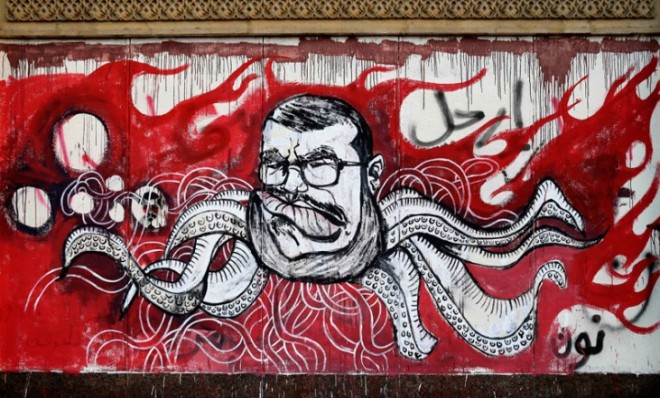
The leaders of Egypt's opposition coalition don't think Saturday's planned referendum on a constitution written by Islamists is legitimate, but they're not boycotting the vote. Instead, they're urging Egyptians to go to the polls and vote "no." They're warning the government of embattled President Mohamed Morsi and his fellow Islamists that they'll call off their plans to participate unless several conditions are met, including full judicial supervision, adequate security, and the presence of independent monitors. Most analysts think the Muslim Brotherhood and its allies will be able to muster enough votes to get this draft of the constitution passed, but opposition leaders vow to keep fighting no matter how the referendum goes. "The referendum is not the end of our journey," says Hamdeen Sabahi, a former left-nationalist presidential candidate.
The opposition has a strong hand, says Kristen Chick at The Christian Science Monitor. Large opposition protests being held on Wednesday could "encourage the judiciary to decide not to oversee the vote, which would prevent the poll from going forward." And if the vote does happen despite the chaos, Morsi's rivals can make a strong showing if they stand united.
The opposition coalition, which calls itself the National Salvation Front, has brought a broad swathe of the opposition under its auspices. It includes secular, liberal, and leftist parties, as well as former presidential candidates like nationalist Hamdeen Sabbahi, who garnered about 20 percent of the vote in the first round of the presidential elections, and Amr Moussa, who took about 11 percent. Former presidential candidate Abdel Moneim Aboul Fotouh, a former reformist Muslim Brotherhood leader who took 17 percent of the first round presidential vote, did not join the group, but his party is also urging Egyptians to vote against the constitution.
Eventually, Morsi will have to "reach out to Egyptians — including Christians, secularists and women — who feel they have been excluded from a revolution they helped create," says The Los Angeles Times in an editorial. But if his rivals have to be united to block this constitution, they're sunk.
Critics of the constitution are divided over whether to campaign aggressively for a "no" vote or urge a boycott of the referendum. That disarray makes it likely that a flawed constitution will be approved by a misleadingly lopsided majority. But Morsi should temper any exultation at such a result with the realization that a prosperous and internationally respected Egypt will have to be not only democratic but tolerant and law-abiding. Anything less will be a betrayal of the broad-based revolution celebrated in the constitution.
The dictatorial power grab that Morsi used to push through this draft constitution certainly stirred up plenty of anger, says Wadah Khanfar at Britain's The Guardian. In fact, it did something that seemed impossible a year ago — it united secularists and liberals with holdovers from the Mubarak era they so recently pushed from power.
The acrimony underscores the need to build consensus on the rules of political conduct, based on the recognition of political diversity and the rejection of violence. The opposition must get used to the fact that Islamists are an organic part of Egyptian political life. Attempts to exclude them would not propel the liberals or nationalists to power but plunge the country into violence and extremism.
As for the Muslim Brotherhood, it must become comfortable with political engagement. It must be open to all components of society in order to reassure skeptics that it does not intend to change the rules of democratic politics. It must give assurances that it will not seize exclusive authority over Egypt for itself and its allies. Numerical majority in a nascent democracy is not a mandate for authoritarianism.
The constitution, which "very few of the demonstrators, on either side, are likely to have read," isn't what matters, says Ellis Goldberg at Foreign Policy. It has some elements the liberals don't like — it gives the government power to "protect ethics and morality," which secularists find particularly dangerous in Islamist hands, it fails to ban discrimination against women, and it allows military trials by civilians. Still, what matters is how the constitution gets interpreted after it's adopted. And the Mubarak-era judges Morsi is feuding with don't exactly trust him right now.
Egyptians along with the citizens of a great many other places have learned what is on paper is only a part of the constitution. The other, most important, part lies in the institutions that give the constitutional language presence in everyday life. To some degree this means the habits and choices of low level officials and to some degree it means the courts. And the simple and sad reality for the Brotherhood is that a great many Egyptians distrust, dislike, or fear them and worry that, having come to control the legislature and central executive, they plan to take over the courts as well as staff many of the lower levels of the government.



